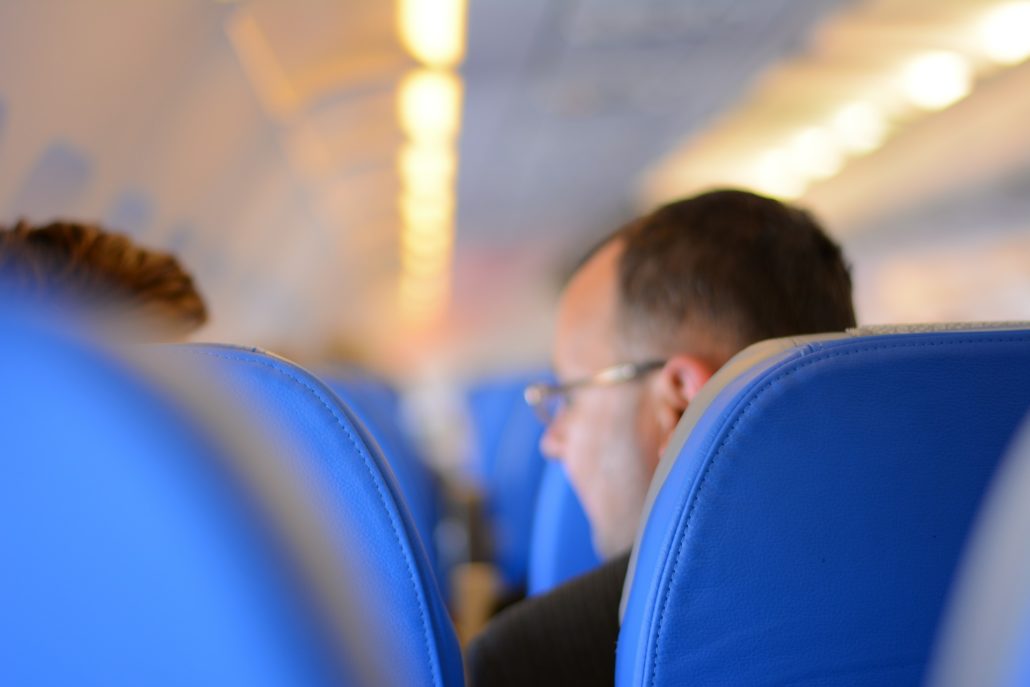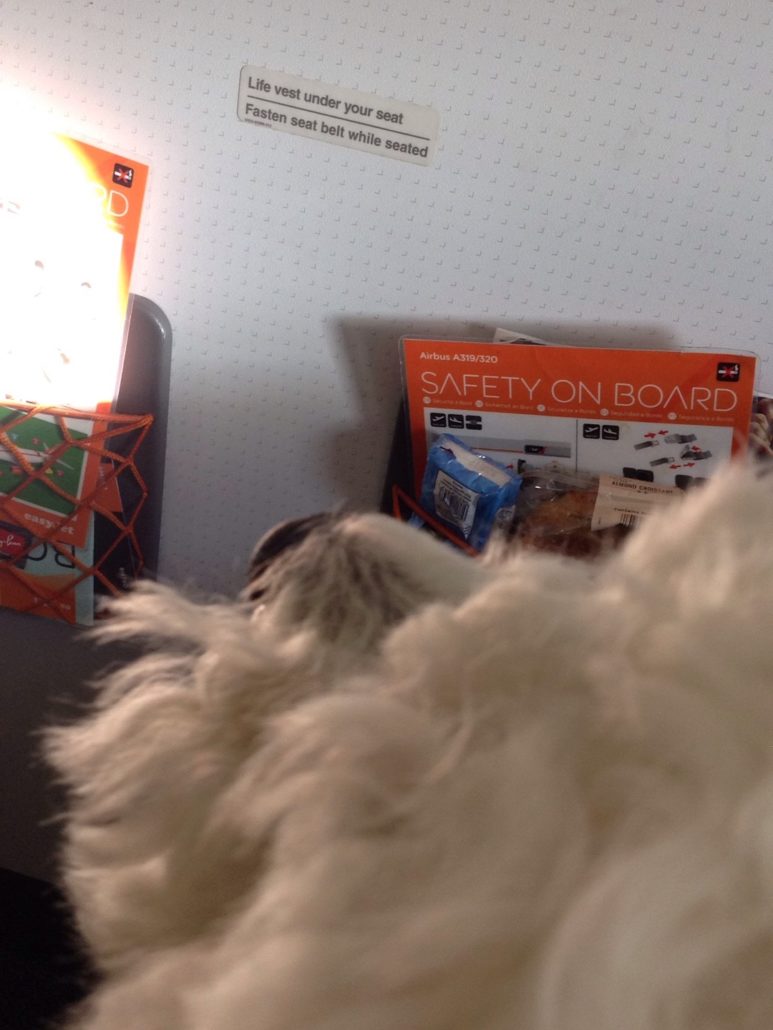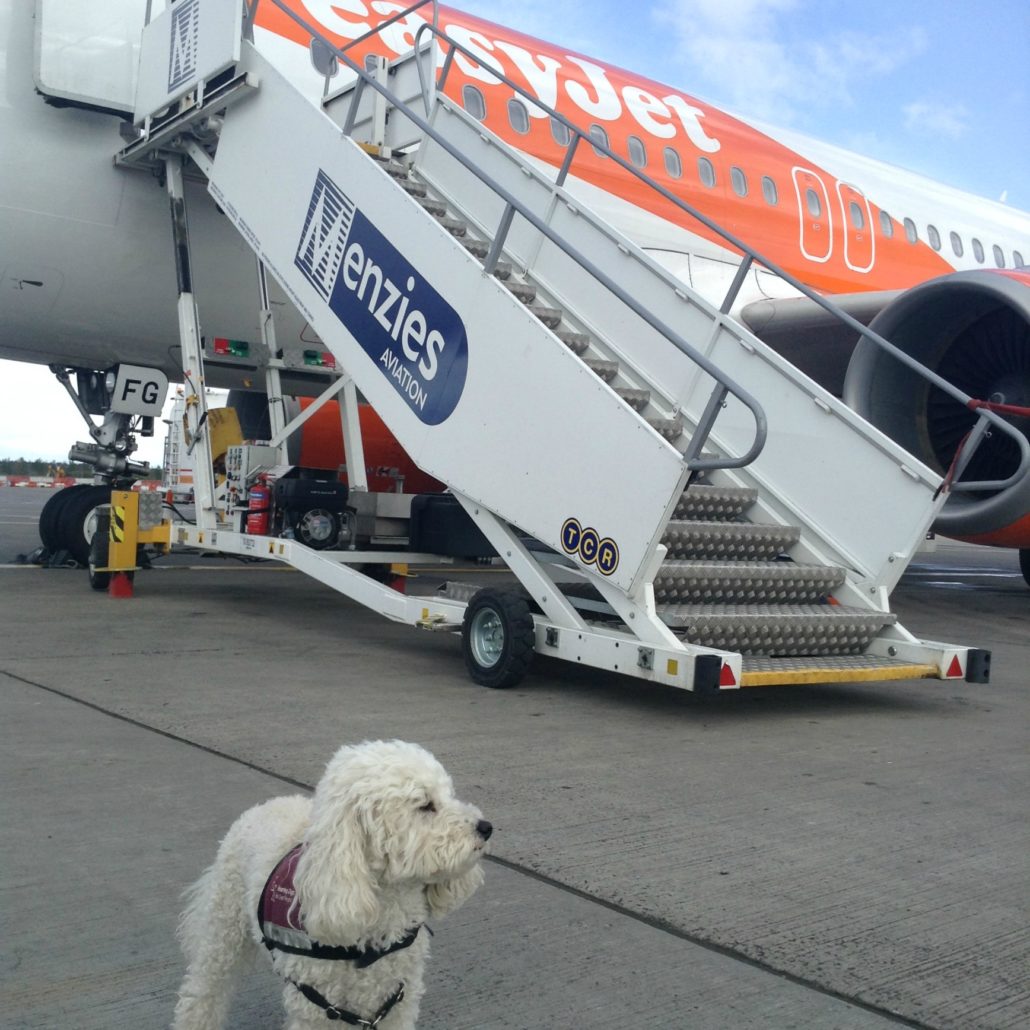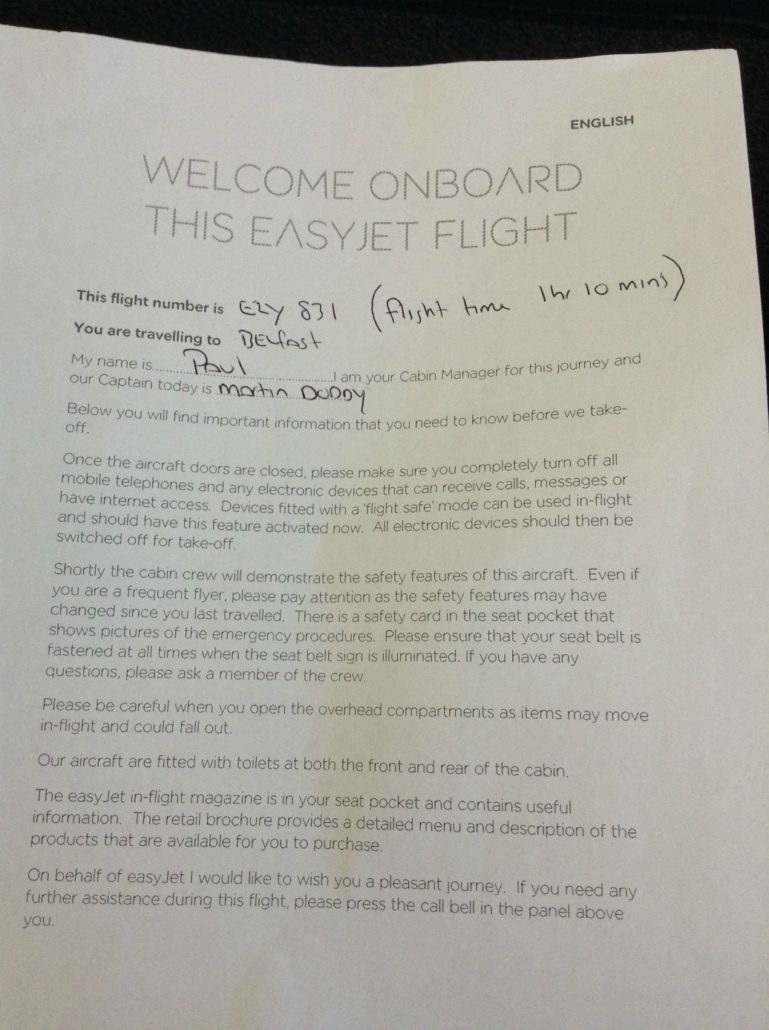Deaf Person’s Guide to Air Travel
I travel a lot for work. Just this week I’ve been to Northern Ireland. However, travelling by plane as a deaf person doesn’t always go smoothly.
Last week I was getting ready to jump on a plane to Belfast when I saw it. My Hearing Dog, Bailey, had chewed through my cochlear implant! How could I have known that my CIs wouldn’t be safe in their little red bag on the coffee table? I guess Bailey saw the open zipper as an invitation. It was not!
As my Facebook friends shared their condolences, I spotted another thread. Another hard of hearing traveller reached out to our UK Hearing Loss Community group in urgent need of help. She had forgotten her hearing aid batteries, and one had already run out.
The group came together and suggested a few stores at the airport they thought might be able to assist. One suggested asking another hearing aid user at the airport for a spare battery, and some folks even offered to try and meet her at the airport to give her some batteries.
I am very proud of our deaf community standing together in such united support. Unfortunately, going to the airport as a deaf person is not always that amusing.
Do airports discriminate against deaf people?
Molly Watt, registered as deafblind at age 12, recently blogged about how her flight with British Airways resulted in her Guide Dog, Isabella, being placed under quarantine. Border patrol stopped both owner and assistance dog after their flight from Berlin.
They reviewed Isabella’s pet passport and inquired whether she had received tapeworm medication in Berlin. She had been given Drontal in the UK the day before travelling so that no extra medication would be needed.
However, border patrol felt this insufficient and Isabella was quarantined. My heart breaks for this woman’s injustice! Although Moly has since had Isabella returned to her, without the need for additional medication, she is still understandably shaken by the whole experience.
I have flown with many airlines, my Hearing Dog in tow. However, Ryan Air wouldn’t even let Bailey fly without a pet passport, even though one is not needed within the UK, only when travelling into or out of the UK.
Another discriminatory incident with Ryan Air also became public this week. Ann-Marie Finch who was diagnosed with multiple personality disorder at age 31 tried to board a plane in Spain to Bournemouth. Both the airport and airline were informed about her disability in advance and that she should be called to board the plane ahead of other passengers to ensure she is comfortable and remains calm.
Anne-Marie became distressed after being bitten by mosquitoes while waiting on the tarmac, which resulted in her acting more child-like with impaired mobility and speech. She was then denied boarding due to “safety reasons”.
After enquiring about my own Ryan Air incident, I received the following response:
CAA will take it up with Ryan Air as a policy issue. They would strongly advise the assistance dog owner to pursue this with Ryan Air, and for the airline to provide compensation, which the CAA thinks they should get, they should pursue this through the arbitration process. CAA will also work with the arbitrator if this is pursued to reinforce that this is an unacceptable process to clarify an assistance dog’s status for internal UK flights.
A feel a bit vindicated. However, I had a similar experience at Gatwick airport, flying with easyJet from London to Belfast, where I was asked twice for Bailey’s pet passport, at security and at the plane gate.
Reflecting on all the bad air travel experiences I, and other deaf people have had, I thought it a good idea to share some airport travel tips with my hard of hearing friends.
Our checklist to travelling with confidence when deaf
When booking your flight
- Have a plan and make arrangements well in advance.
- When changing planes at an unfamiliar airport make sure you know the layout and where the accessibility facilities and staff are.
- Sign-up for flight change alerts via text or email.
- Try to book a seat at the front of the plane where the flight crew can easily assist you. Do not book a seat in the exit row.
Preparing for your trip
- Take a notepad and pen with you for easy communication.
- Arrive at the airport early and keep checking the departure board.
- Hire a travel agent that is informed about the needs of a hard of hearing or deaf person.
- Pack extra batteries and tubing for hearing aids and other assistive devices.
- Take a humidifier to dry your hearing devices each night to prevent moisture problems.
- Place identification tags and labels on the inside and outside of your luggage.
- Keep important travel documentations, batteries and medication close by.
- Make sure you have comprehensive travel and medical insurance before you leave.
- Make use of the Special Assistance service at the airport. They will accompany you to the plane and off the plane at the other side, and may even carry your bag! Belfast International Airport have a useful Hidden Disabilities scheme for passengers. They offer a special lanyard to wear in the airport which signals to staff that you have a hidden disability and may require extra assistance. A brilliant idea! (PDF: Travelling with a Hidden Disability)
When travelling with your assistance dog
- Inform the airline at least 48 hours in advance that your assistance dog will be travelling with you. When you declare that you have an assistance dog when booking your ticket, there is no need to choose a seat – they will automatically assign you a front-row seat.
- If you’re travelling to the UK with an assistance dog, you must confirm your flight details with the airport’s Animal Reception Centre, so they’ll meet you when you arrive.
- Carry evidence that your assistance dog is, in fact, an assistance dog and not a pet. If they ask for your pet passport and you are travelling within the UK, I found it effective to just give them my Hearing Dog’s ID card.
- Make sure you have all the veterinary health certifications with you if you are travelling outside the UK.
- You must have a dog safety harness so that you can secure your Hearing Dog during take-off and landing. The airline can supply you with this on board. Sometimes they tell me to slip my seatbelt through his lead’s handle instead to secure him.
- It’s also advisable to have some form of fleece or doggy bed with added padding for your dog to lie on. Bailey is happier when on my lap and the flight crew are fine with this.
Going through security
- You can leave your hearing aids and CIs in. They do not have to be removed before going through airport scanners.
Boarding the plane
- Inform the flight crew and staff of your communication needs.
- Ask the flight assistant to inform you when there are travel changes.
- You may be given a handout with information about the flight, see below for the typical handout I am given.
Whether for business or pleasure, travelling is an important part of our lives and should be just as enjoyable to a deaf person as a hearing person.
There are many challenges we face when travelling by plane, but if you take some time to prepare and use the above lists, you will feel more confident for your next flight.
Do you have a deaf travelling story to share? Tell us in the comment section below; I would love to read it.
Leave a Reply
Want to join the discussion?Feel free to contribute!







That hand out is great. I’ve never been given one and I’ve flown many times.
Thank you for your article! I always have trouble hearing announcements and even ordering a beverage. I hadn’t thought to tell the flight crew I am HoH. Plus, I always take out my hearing aids when I fly or the cabin noise gives me a bad headache. Consequently, I hear pretty much nothing. I can see this being a safety issue, as I cannot hear instructions. I will plan on telling the flight crew from now on. Do you think I need to call the airline in advance to tell them, too?
Thanks again. I’m so sorry Bailey ate your CIs. I hope your trip was okay anyway!
Hi Val! We have the option when purchasing an airline ticket online to declare if special assistance is required, and this flags up on their system, then you report to the Special Assistance desk in the airport when you arrive, and they take care of you from there. It’s fabulous. I got a new CI so I’m happy! And we are having a good trip. Hope you are well.
thanks, Tina! I fly tomorrow and I’m at least going to try to say something. Your article is really helpful! Enjoy your holiday and pat Bailey for me! ❤️
Thanks Val. Enjoy your trip and let us know how you get on! Bailey is patted for you 🙂
Thank you for this useful information, should I need to take my Hearing Dog on a plane.
I didn’t think you could walk through the scanners with CI in, in case it upset the mapping?
On recent flights with Aegean Airline from Birmingham to Athens and back, I was quite impressed with the plane on the way back home as it had TVs, hoisted to the ceiling above passengers, with subtitles, first in Greek then in English, which was very much appreciated.
I also found downloading the Aegean App, recommended to me by another passenger, really useful as this meant I received all the necessary alerts re Gate number, boarding the plane, etc.
Hi Mags, it is ok to walk through airport scanners with CIs in. I’ve never had an issue. Good tips on the Aegean airline, thanks!
Such a good guide, being out first flight this Sunday from Heathrow to Belfast.
Can you confirm we do not need to go to the Animal Reception. BA said no but I keep reading contradictory info!
Thanks